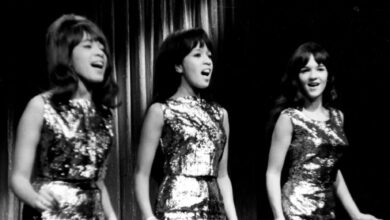Sgt. Barry Sadler’s “Ballad Of The Green Berets” Presents A Moving And Patriotic Homage
In 1966, Staff Sergeant Barry Sadler made a significant impact on American music and culture with the release of “The Ballad of the Green Berets.” As a patriotic anthem during a tumultuous time in U.S. history, the song resonated deeply with a nation grappling with the realities of the Vietnam War. The lyrics pay tribute to the courage and sacrifice of the U.S. Army Special Forces, known as the Green Berets, framing their service in a glorified light that appealed to both soldiers and civilians. Sadler’s personal experiences as a medic in Vietnam, where he was injured in combat, provided him with a profound understanding of the sacrifices made by those in uniform, making his message even more poignant.
Sadler’s journey to this iconic moment began long before the song’s release. Born on November 1, 1940, in Fort McPherson, Georgia, he grew up in a military family. His father served in the Army, which fostered a deep sense of duty and patriotism in Sadler. After high school, he enlisted in the Army and eventually became a combat medic, serving in Vietnam from 1966 to 1967. These experiences on the battlefield indelibly shaped his perspectives on war and sacrifice, lending authenticity to his songwriting. His life in the military and the trauma he witnessed were key factors that fueled the emotional weight behind “The Ballad of the Green Berets.”
Upon its release, “The Ballad of the Green Berets” soared to the top of the Billboard Hot 100, where it held the No. 1 spot for five consecutive weeks, a testimony to its popularity during that era. The song was among the top-selling singles of 1966, standing alongside chart-toppers from iconic bands such as The Beatles and The Rolling Stones. This unexpected success transformed Sadler’s life, propelling him into the limelight as a recording artist and cultural figure. He became a symbol of patriotism, often appearing on pivotal television programs of the time, including The Ed Sullivan Show, where he shared his song and its powerful message with a broader audience.
However, the initial success of “The Ballad of the Green Berets” did not lead to a sustained musical career. Sadler faced the challenge of following up a monumental hit, and though he released several subsequent recordings, they failed to match the impact of his first. This setback pushed Sadler to explore different avenues to sustain his livelihood, showcasing his versatility beyond music. He ventured into acting and attempted to establish a presence in the business world, navigating through the complexities of life after combat and fame. His artistic pursuits were not just a means to an end but reflected a struggle to adapt to life beyond the military, holding onto the identity that had been so intertwined with his service.
In the late 1970s, Sadler shifted his creative focus toward writing, producing a series of pulp novels centered on the character of Casca Rufio Longinus, a Roman soldier condemned to wander the Earth until the Second Coming. The series, although not celebrated widely in literary circles, gained a loyal following. The unique storyline combined elements of history, religion, and adventure, allowing Sadler to explore themes similar to those found in his music—heroism, sacrifice, and the human condition. The novels provided an outlet for his creativity, and the character of Casca became an extension of Sadler’s interest in wartime experiences and the existential questions that arise from them.
Yet, even as he pursued these new creative endeavors, Sadler’s personal life took a tragic turn. In 1978, he was involved in a disturbing incident that resulted in the death of country music songwriter Lee Emerson Bellamy. Sadler was found guilty of voluntary manslaughter, and this legal battle significantly altered the course of his life. The fallout from this incident forced him to confront the darker aspects of his existence, overshadowing his previous accomplishments. Following a reduced sentence, he moved to Guatemala seeking a fresh start, but the remnants of his past continued to haunt him. In Guatemala, he not only continued to write but also became involved in providing medical assistance to civilians caught in the civil conflict, merging his passions for medicine and storytelling.
Tragically, Sadler’s narrative took another dark twist when, in 1988, he was shot in the head during a robbery attempt in Guatemala. This violent act marked a severe turning point, leading to medical complications that left him in a coma and ultimately resulted in quadriplegia. The vibrant figure who had once so powerfully captured a generation’s spirit through song faced immense struggles as he battled the physical and emotional ramifications of his injuries. His return to the United States was marked by a profound shift in his life, as he navigated the challenges of rehabilitation and the loss of independence.
Barry Sadler passed away in 1989 due to complications related to his injuries, but his legacy endures. “The Ballad of the Green Berets” continues to be played at military events and memorials, serving as a somber reminder of the sacrifices made by servicemen and women. The song is often regarded as a cultural artifact of the Vietnam era, embodying both patriotism and the complex emotions surrounding the conflict. It serves not only as a tribute to those who served but also as a medium for reflection on the costs of war and the stories of the soldiers whose experiences are often overlooked.
Despite the controversies that overshadowed his later years, Sadler’s contributions to music and literature remain significant. His ability to connect with audiences through poignant storytelling reflects a deep understanding of the human experience. He was more than an artist; he embodied the struggles and triumphs of those who served, reflecting the dualities of heroism and personal strife. The complexity of his life and career invites discussion about fame, responsibility, and the intricacies of living authentically amid external pressures and failures.
The legacy of “The Ballad of the Green Berets” persists as more than a mere melody; it endures as a representation of a time when the American public was grappling with its values and identity. Sadler’s journey invites conversations about the lasting viewpoints of veterans and how society chooses to honor and remember them. Through his music and later writings, he fostered a greater understanding and appreciation for the bravery of soldiers, infusing his narratives with a sense of pride that continues to resonate today.
Thus, the life and work of Barry Sadler serve as a testament to the intersection of heroism and personal turmoil, particularly within the context of the Vietnam War and its aftermath. The juxtaposition of his patriotic celebration of the Green Berets against the complexities of his personal history provides a compelling narrative in American cultural history. Sadler’s contributions invite ongoing reflection on the costs of service and the nuanced experiences of those who wear the uniform, echoing the need to honor their stories and sacrifices in both art and life.



